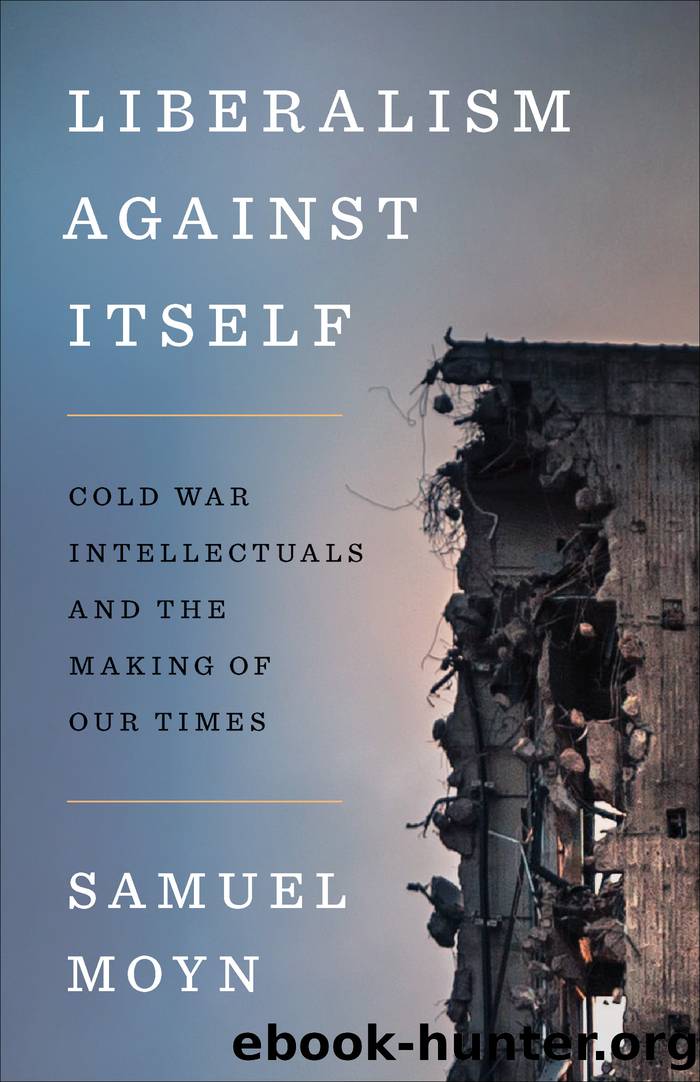Liberalism Against Itself by Samuel Moyn;

Author:Samuel Moyn;
Language: eng
Format: epub
ISBN: 9780300274943
Publisher: Yale University Press
Published: 2023-08-15T00:00:00+00:00
Lionel Trilling, 1950s
6
Garrisoning the Self:
Lionel Trilling
Around 1930, Lionel Trilling drafted a scathing review of Sigmund Freudâs Civilization and Its Discontents, which had appeared that year. Written in his mid-twenties, two years before he returned for his doctorate in English literature to Columbia University (where he then taught for decades), Trillingâs screed was never published, and subsequently lost. Forty years later, he confided to his journal that he feared someone would find it.1 But he recalled in a letter what he had said: he denounced Freudâs pessimistic tract as âridiculous and even offensive.â2
At the time, Trilling remembered, âany explanation of the human condition by reference to anything else than economic and political injustice seemed to me morally indecent. And the âdiscontentsâ that Freud referred to seemed to me absurd and, indeed, really inconceivable.â3 The bar that psychic forces supposedly placed on emancipation did not make sense to himânor did the uses of Freud in building some account of the psychic life of power for the sake of challenging it. Instead, the young Trilling worried that Freudâs emphasis on aggression could recast the contingent and sociohistorical as the natural and necessary. And it did: with Trilling in the lead, Cold War liberals canonized Freud and Freudâs essay to insist on an original form of liberalism premised on durable limits to reform.
The essays Trilling wrote in the later 1930s and 1940s established the position of his epochmaking The Liberal Imagination, his Cold War liberal triumph of 1950, which sold nearly 200,000 copies. This book is perhaps the essential one, alongside Trillingâs 1947 novel The Middle of the Journey, in rethinking the whole era of liberal political theory. By canonizing Freud for Cold War liberalism, the mature Trilling ratified the abandonment of the Enlightenment, the vilification of progress for fear that it always serves as pretext for terror, and above all the psychic self-constraint at the core of liberal thought.
People tend to think of Cold War liberalism as a political stance with familiar prescriptions in domestic and foreign policyâand its eternal return in that form is certainly striking. But like so many such doctrines, it was as much about the self as about the state or society. Its call to contain disorderly passion for the sake of austere freedom fit, in some of its guises, with an ideology of self-control in deep tension with the Cold War liberal championship of liberty as non-interference, and even with its insistence on avoiding crueltyâfor it also required brutal self-subjugation and self-policing for the sake of personal and collective order.
Cold War liberalism thus demands the kind of analysis that connects the political and the personal. The coming of the early modern state has elicited that understanding, accompanied as absolutism was by a call to control the passions. A new kind of polity had depended on individuals who policed themselves.4 And emerging modern governance earned a comparable perspective from the great French liberal moralist Alexis de Tocquevilleânever mind that in canonizing him, Cold War liberals also bowdlerized him. Like
Download
This site does not store any files on its server. We only index and link to content provided by other sites. Please contact the content providers to delete copyright contents if any and email us, we'll remove relevant links or contents immediately.
| Buddhism | Christianity |
| Ethnic & Tribal | General |
| Hinduism | Islam |
| Judaism | New Age, Mythology & Occult |
| Religion, Politics & State |
Cecilia; Or, Memoirs of an Heiress — Volume 1 by Fanny Burney(31333)
Cecilia; Or, Memoirs of an Heiress — Volume 3 by Fanny Burney(30934)
Cecilia; Or, Memoirs of an Heiress — Volume 2 by Fanny Burney(30889)
The Secret History by Donna Tartt(16627)
Sapiens: A Brief History of Humankind by Yuval Noah Harari(13054)
Leonardo da Vinci by Walter Isaacson(11904)
The Radium Girls by Kate Moore(10908)
Sapiens by Yuval Noah Harari(4538)
The Wind in My Hair by Masih Alinejad(4424)
How Democracies Die by Steven Levitsky & Daniel Ziblatt(4399)
Homo Deus: A Brief History of Tomorrow by Yuval Noah Harari(4280)
Endurance: Shackleton's Incredible Voyage by Alfred Lansing(3845)
The Silk Roads by Peter Frankopan(3762)
Man's Search for Meaning by Viktor Frankl(3635)
Millionaire: The Philanderer, Gambler, and Duelist Who Invented Modern Finance by Janet Gleeson(3569)
The Rape of Nanking by Iris Chang(3516)
Hitler in Los Angeles by Steven J. Ross(3438)
The Motorcycle Diaries by Ernesto Che Guevara(3333)
Joan of Arc by Mary Gordon(3259)
